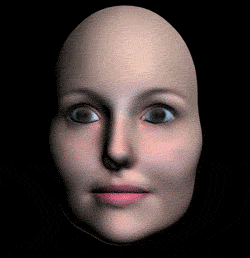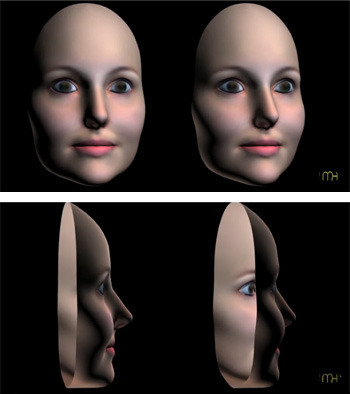6 Tiny Things That Indicate You've Got Huge Medical Problems

If you're into hypochondria, science (and WebMD) offers you ample opportunities to believe that almost every little daily inconvenience is a potential indicator of a horrific underlying disease. Well, we don't intend for this article to feed anyone's paranoia; we just want to point out that our bodies are confusing boondoggles of organs, designed by a madman. That means that trying to connect specific symptoms to specific diseases can lead you down a path to madness.
For example ...
Your Reaction To A Specific Optical Illusion May Indicate Schizophrenia

The hollow mask illusion is a feat of optical witchcraft that tricks your brain into thinking that the inside of a rotating mask is exactly like the outside -- a face with protruding features. Here, give it a try. We'll wait.

That was awesome, right? It looks like a regular face, and then it turns out it was only the inside of the ma-- wait, you're saying it didn't fool you for a second? Well ... we don't want to alarm you, but...
Collaborators from the Hannover Medical School in Germany and the UK's UCL Institute of Cognitive Neuroscience found that there is a very specific subgroup of people who are totally immune to the cerebral fuckery of the hollow mask illusion: schizophrenics.
Wait, What?
A study found that most of us are woefully ill-equipped to defeat the mask's trickery, falling for the illusion an absurd 99 percent of the time. Schizophrenic volunteers, however, revealed themselves as the Michael Jordans of hollow mask detection. They were only fooled about six percent of the time. So while schizophrenia is a horrible affliction, at least suffers can boast one bona fide if extremely limited superpower.

Why? Well, at certain angles, the mask fools the average person because the brain can't gather enough visual cues to determine that the mask is concave, which faces usually aren't. So to make sense of the alien freak staring it in the eye, your brain forces you to see what it thinks is correct. As the mask continues to rotate, the queer play of light along the edges reminds your brain to freak out once more as the illusion is disrupted. This of course doesn't stop it from falling into the same "Holy shit, I know what that is, a face!" trap all over again.
Schizophrenics, on the other hand, are unable to fully conceptualize incoming sensory information. Their minds skip the intermediate step and make no effort to rectify the mask's odd appearance -- the empty hell-face isn't weird enough for their brain to correct.
Snoring As A Kid Might Have Turned You Into A Social Train Wreck

Did you snore as a kid? Do you have a kid who snores? Are you, on principle, against all kids and snoring? Strangely enough, if you answered "Yes" to that last question, chances are that you're a better-adjusted human being than the snorers in the first two, because snoring young kids totally have an increased chance to become fuckups later in life.

Wait, What?
Let's talk about a little-known issue called "behavior problems in children based on their general sleep etiquette." It's a real thing, as revealed by a study that tracked 249 child-mother pairs for three years. The researchers found out that the kiddies who snore during their formative years (aged 2-3) tend to display the holy triumvirate of douche behaviors: inattention, aggression, and hyperactivity. As a result, the kids who snored were three-and-a-half times more likely to be awful hellraisers than their nose-breathing sleep brethren.

Another study focusing on sleep apnea in children noticed the same trend. The six-year study included 11,000 children: 5,000 "normal" ones and 6,000 who suffered from a variety of apneas. The children with breathing problems during sleep were 40 percent more likely to develop behavior problems by age seven. We're not merely talking about them being more sensitive because they fell asleep in class once and everyone found out about the snoring, either. These symptoms were, and we quote, "anxiety and depression, peer relationship problems, conduct problems such as following rules and social behavior toward others." That's a textbook description of the mindset of either a future criminal or a politician, both of which are bad news if you're attempting to raise an upstanding citizen.
Fortunately, science might have found a solution to the whole potential "snoring kids will grow up to be our barbarian overlords after the apocalypse" issue. Unfortunately, it is already a subject of considerable debate. We're talking about breastfeeding -- specifically, how long it should be done. Research indicates that relatively late weaning is the strongest predictor of childhood snoring, as none of the children who suckled at mother's teat for longer than 12 months were found to snore. On the other hand, those who were breastfed sparingly or not at all were almost 25 percent more likely to develop a chronic snoring problem.

And while we're on the subject ...
Sleep Restlessness Can Predict Whether You'll Get Parkinson's Disease

Do you ever have dreams where you're attacked or chased, only to wake up tangled in the sheets (or clobbered with a pillow by your frustrated spouse, whom you just dream-flailed at?) It turns out that shit might not be last night's chili -- it may actually predict your future Parkinson's.
Wait, What?
All that restlessness is likely to be a symptom of REM sleep disruption, caused by plunging dopamine levels in the susbtantia nigra. That's the brain region responsible for coordination of movements (like the way your chip-bearing hand navigates to your mouth while your eyes remain fixed on the TV screen). Without dopamine doing its thing during REM, your limbs are free to battle dream invaders and poor, sleeping bedmates.

People with this particular condition are more likely to develop Parkinson's than sound sleepers. How much more likely? Try, "a study indicates that up to freaking 45 percent of them wind up with the disease" likely. Oh, and another study found followed 21 REM-frustrated subjects for eight years. Of the 10 of them that displayed irregular dopamine levels, seven developed neurodegenerative disorders.
That's pretty serious shit. Luckily, there's a silver lining: Researchers can now track the whole dopamine/REM activity thing in real time, through a neuroimaging technique called Single Photon Emission Computed Tomography, aka SPECT (because all brain-spying technologies need a supervillain name). SPECT is rapidly emerging as a super important tool in early onset Parkinson's study because its REM-spying abilities can recognize the disease even before the first symptoms appear. This may well give us a shot at creating a whole new breed of neuroprotective drugs in the future.

Speaking of weird tests we all might be undergoing soon ...
Sweating Too Little Increases Suicide Risk (If You're Depressed)

Be honest, now: Do you sweat when you're nervous? It's one of the curses of the socially awkward -- you're already feeling weird about being on a date (or at a party, or at a wedding, or on a routine trip to the grocery store ...), and now you're doubly self-conscious about the fact that you look like your armpits have pissed themselves.
Well, we have good news: You might be at lower risk for suicide.

Unless you just ruined your dream date with your excessive sweating.
Wait, What?
To put it simply, one of the signs of going from "bummed out" to "depressed enough that you want to die" is that your body's reflexive responses get dulled. Responses like involuntary fear sweat. A study was performed on about 800 people who were being treated for depression. They were hooked up to sweat detectors and then stressed out (by having a series of sudden loud noises played at them).

All people reacted to the initial noise, but the depressed and suicidal quickly became biologically indifferent and showed dulled reactions thereafter. Incredibly, the lower sweat response was seen in an astonishing 97 percent of those who later committed suicide, yet in only two percent of the ones that did not.
Obviously, our point isn't that your lack of fear sweat is a death sentence -- some people simply don't sweat very much. The findings are useful because it means there's a chance that science might come up with a simple physical test that can literally help predict if somebody is at risk of suicide. If true, that would be huge. Right now, they try to gauge that with a series of questionnaires, and honestly, it's not like filling out that shit puts anybody in a better mood. Even if the alternative is hooking you up to wires and hitting you with a series of jump scares.

Use the back if you need more space."
A Weak Bite Can Be A Sign Of Dementia

Are you a senior citizen, and struggle to win pie-eating contests like you used to? Do you find it harder to tear off beer bottle caps with your teeth? This may seem like a minor inconvenience, but it could be a sign that your brain is about to stop working.
Wait, What?
The Karolinska Institutet -- that's not a typo, by the way, just Swedish -- has some bad news for people with weak bites. Not only do most predators think you're a pansy, but you're also at increased risk of developing a serious neurogenerative disease. The Institutet made 557 participants aged 77 or over eat apples while bite-plate sensors analyzed how much force each subject imparted into the fruit's supple, yielding flesh.

A majority of the participants brought expired coupons.
Those who had trouble chewing were more likely to show symptoms of dementia than the ones that chowed theirs down with little trouble. Presumably, those who asked the apple why their kids don't call anymore were disqualified for already having the disease. Another study from Japan, done with slightly more spry 60-somethings, indicates roughly the same thing, also noting that the subjects with less dementia seem to have considerably more teeth.

It is believed that the whole shebang is about the way chewing makes the blood flow. Mastication is basically workout for your face, and if you're unable to do it properly, the blood flow in the brain reduces, essentially leaving your Head Ferrari running on fumes. So remember, kids: You can always tell the mental health of an old person by running up and making them bite through a stick. Just shove it right in there. They'll understand.
Simple Smell Tests Can Detect Alzheimer's ... And Psychopaths

We've told you time and time again how your sense of smell, that rascal that you think you mainly use to detect fresh donuts and recipients of the prestigious Office Farter prize, is in fact the mastermind behind a veritable shit-ton of tricks that influence your perception of the world. Well, bizarrely, this connection means there are simple smell tests that can instantly recognize some very specific brain conditions you may have.
Wait, What?
Let's start with Alzheimer's. In a medical first, scientists at the University of Florida's McKnight Brain Institute have used peanut butter to treat a disease rather than cause it. All you need are a jar of peanut butter, a ruler, a friend, and a magic spell that makes the both of you able to not chow down the PB at once. To begin the test, close your eyes, mouth, and one nostril. Have your friend hold the peanut butter at chest height, then slowly raise it until you detect the slightest whiff and mark the nose-to-peanut distance. Repeat for the other nostril.

If the scores are more than four inches apart and your left nostril is weaker, congratulations! There's a higher chance you will develop Alzheimer's. A grad student came up with this ingeniously simple test when she realized that conventional testing for cognitive disease overlooked the sense of smell, which is kind of weird, since the downward spiral of cognitive decline begins at the first cranial nerve, which happens to be the tract that relays olfactory information to the brain. Peanut butter was chosen because it was cheap and pungent -- scientifically described as a "pure odorant."

Oh, and of course there are more layers in the shit sandwich for the olfactorally-impaired. Research also shows a strong link between a poor sense of smell and goddamned psychopathy. Australian researchers have been able to categorize psychopathic tendencies by olfactory aptitude. Using scented markers, researchers conducted a battery of tests to reveal closet psychopaths. Their 79 subjects, aged 19 to 21, were asked to kindly refrain from stabbing cohorts while identifying the markers based on scent. The budding psychopaths in the group had the most trouble, even when they were told what the marker was supposed to smell like. They were also remarkably unable to differentiate between odors.

This is potentially pretty damn important, because (once again) now we might have a simple test that can offer an objective way to qualify a disorder we've usually tried to recognize with stuff like questionnaires, which are always subjective. This is especially useful for dealing with keenly manipulative Patrick-Bateman-style psychopaths, who could otherwise charm their way to a sane diagnosis and dinner with the interviewer. Of course, the researchers are first to admit that poor olfaction isn't always a sign of impending psychosis, and could be the cause of other factors, such as schizophrenia or Parkinson's. Well, that or you could have a runny nose.
For more ways you can't trust your body, check out 5 Mind-Blowing Ways Your Senses Lie to You Every Day and 5 Ways Your Brain Is Messing With Your Head.
Are you on reddit? Check it: We are too! Click on over to our best of Cracked subreddit.
